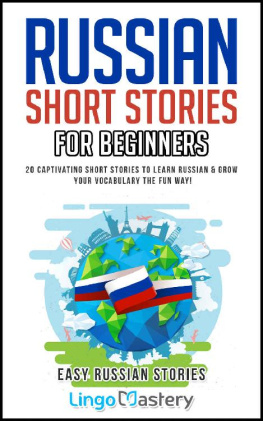The Business English Vocabulary Builder
Powerful Idioms, Sayings and Expressions to Make You Sound Smarter in Business!
www.LingoMastery.com
Copyright 2020 by Lingo Mastery
ALL RIGHTS RESERVED
No part of this book may be reproduced, stored in a retrieval system, or transmitted in any form or by any means, electronic, mechanical, photocopying, recording, scanning, or otherwise, without the prior written permission of the publisher.
Contents
Introduction
Welcome to The Business English Vocabulary Builder.
Business idioms in English can be a confusing and intimidating territory even to the best language student, which is why a concise dictionary such as this one is such a useful and beneficial acquisition. Whenever you hear an unfamiliar phrase, you can check its definition within these pages, and reinforce the knowledge in your mind for the next time it pops up in conversation.
Within this book youll find hundreds of new ways to express yourself in every business situation that you can imagine! While some of the idioms in this book can be applied outside of a business context too, ALL of them can be used to improve your fluency and understanding when at work, and in other professional settings.
English is a rich and versatile language weve provided at least one example for each idiom, but we recommend that you practice using them by forming your own examples and testing them in real conversations. Dont be afraid of making mistakes in spoken English thats how we learn!
Nothing improves communication more than actually communicating, and this book will help you to become more comfortable and fluent in native and natural English-speaking situations, both inside and outside of the boardroom. Your confidence will build, leading you to feel more at ease and less overwhelmed.
As you use this book, youll notice some phrases highlighted in bold throughout the explanations on each page. These are other idioms and useful phrases for a business environment. If the meaning of the phrase is unclear, then you will be able to check its definition in the appropriate place in the book. We have alphabetized the whole book over two hundred idioms in total! This makes it easier for you to find the right place when looking for a specific meaning.
Idioms, phrasal verbs, and other English terms and phrases are often described as being the most difficult aspect of the language to grasp. With this book, weve swapped difficulty with interesting facts! Where possible, weve tried to give you some linguistic knowledge on the roots of the idioms and phrases discussed. Sometimes, understanding something at a deeper level can help with knowledge retention.
Some tips before you get started:
- Use each new phrase as soon as possible practice makes perfect!
- Keep this book in your bag youll want it close at hand in times of need !
- Dont be afraid of making mistakes youre on a learning curve !
So, what are you waiting for?
Delve into the interesting world of English phrases that dont mean what they seem and become the fluent language student that you were born to be!
Idioms
A full plate/A lot on your plate
To have a full plate is to be very busy. The more that you have on your plate, the busier you are. A plate is the flat dish that you eat food from, and as you know, a full plate cannot fit any more food on it. Likewise, if your schedule is full, you cannot agree to take on any more tasks.
A: Can you finish off Robs assignment, please?
B: Im sorry, Ive got a full plate at the moment, Sarah. I cant take on any more work.
A: Are you okay, Jennifer?
B: Yes, John. Ive just got a lot on my plate right now.
Ahead of the curve
If you are ahead of the curve , then you are ahead of those around you in terms of current trends and/or business approaches. The expression is a positive one and can be used in professional situations. It was originally expressed as ahead of the power curve and dates to the 1920s when airplanes were becoming more popular and common.
A: Jennifers Boutique offers a unique dining and shopping experience. Theres really no other place like it!
B: I know, theyre really ahead of the curve in main street shopping.
A learning curve
To be on a learning curve means that you are quickly gaining knowledge in a particular subject. Adjectives such as steep, intense, and rapid may be added to give more meaning. Often, the phrase is used to illustrate that someone has learned from a mistake.
A: This semester has been quite the learning curve for you, hasnt it?
B: Yes, I feel like Ive learned a lot with you.
A: How do you feel about yesterdays performance?
B: It was terrible, the audience hated my jokes. But Im on a learning curve Ill change some of them for tomorrow.
A long shot
If something is a long shot , then it is unlikely, but still possible. Historically, the phrase is interchangeable with not by a long chalk and means that something wont take place by any means. The phrase comes from the past British practice of using chalk to record scores, often on any flat surface that could be found in the vicinity.
A: Do you know anyone who can help me?
B: Its a long shot , but I could call my cousin.
Ahead of the pack
If someone is ahead of the pack , they are better than the others around them who are trying to accomplish/learn the same things. The word pack refers to a pack of wolves who travel together in groups. To be ahead of the pack suggests that you are somehow better than the pack, an innovator and forward thinker.
A: Kenny is incredible; he really is ahead of the pack .
B: Yeah, hes moving up in leaps and bounds.
Angel investor
Angel investing refers to private investment in entrepreneurial companies, that is, companies which invest in purchasing risky stocks in the hope of the company succeeding and reaping a profit. Other terms that mean the same thing include seed investor, business angel, and angel funder.
A: Liam, an angel investor from South California, says that start-ups should be better supported by the government as well as private investors like himself.
B: But can the government justify risking taxpayers money on start-ups that might fail and lose the country millions, Karen?
At arms length
The phrase dealing at arms length is used to describe the relationship between two unrelated people or entities, where neither has control over the other.
More generally, to keep something or someone at arms length can also mean to keep them at a distance, and to not involve yourself directly with that person or thing.
A: The transaction was made at arms length .
B: So, none of the parties had any ties to each other?
A: They were entirely unconnected and held no jurisdiction or influence over the other.
A: Ive never trusted him. I keep him at an arms length .
B: I feel the same. I dont think he can be trusted at all.
At stake
When something is at stake , it is at risk or under question, and it may be lost as a result of current actions or circumstances. Profits may be put at stake by a questionable choice in packaging design, or employment positions may be put at stake by budget and funding cuts. You may hear the term being used to exaggerate risks and possible outcomes of controversial suggestions and ideas. The phrase apparently originates in bear fighting, where people would place money bets on a bear tied to a stake and attacked by dogs.

















